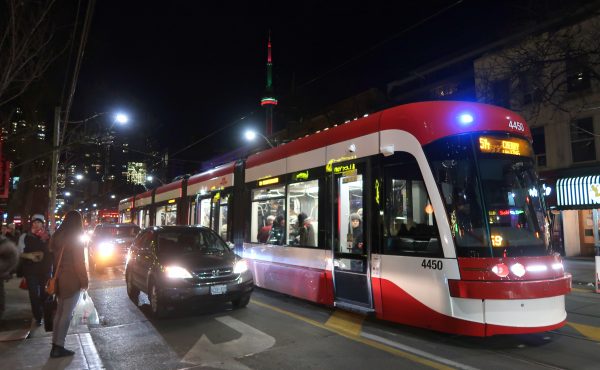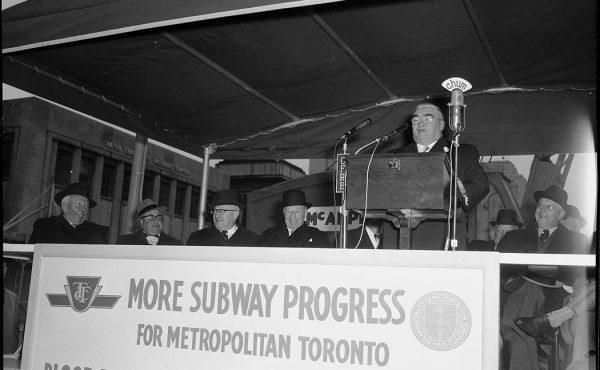
One can only imagine the thoughts that must have chugged through Andy Byford’s mind last week when he found himself forced to inform the mayor’s office that his cell phone was not for incoming personal calls from Mr. Subway3.
The precise chronology of the shelter bus incident at the Don Bosco football game remains somewhat murky, even though the police gamely threw themselves on this ticking hand grenade. But no one disputes that Rob Ford left a message for Byford in the midst of the alleged tumult, wondering why his bus was late.
As he briskly laid down the rules of engagement for the chief magistrate, did Byford quietly say to himself, “I threw away a big league career atop Sydney’s massive RailCorp to join this gong show?”
I have no special insight into Byford’s frame of mind, and for the record, he’s offered absolutely no hint of dissatisfaction. But the question is hard to ignore. After all, RailCorp is an AUS$3.5 billion operation with 15,000 employees and almost 300 million riders annually. And Byford, who spent two years down under as chief operating officer, earned AUS$422,850 a year, according to the agency’s 2010-2011 annual report. (The Australian dollar and the loonie were almost at par at the time.)
His salary as TTC CEO, by contrast, is $303,885 (frozen until next year), so one can see the quantum of the financial sacrifice involved – a 28% pay cut to come to a city where the mayor treats him like a saviour one day and a servant the next.
This is not to suggest that Byford, who earned his stripes in the British rail system and then with the London Underground, is motivated by money. I’ve been impressed with his sang froid during the Union Station flood, his seriousness as an operator and his obvious dedication to bolstering the TTC’s customer service performance. He’s clearly a transit guy with world-class credentials.
But for those very reasons, I wouldn’t be the least bit surprised if he jumped on the first train out of here (his contract, according to TTC spokesperson Brad Ross, is indefinite). And who could blame him? He’s a guy who can write his own ticket, and likely joined the TTC for the same reason that star athletes accept trades to struggling teams: they want to see if they have the jam to turn things around.
Byford, of course, isn’t worried that his bloodied scalp will be left in the civic square as a warning. He’s got the Commission’s support. Ford, morever, is sufficiently invested in Byford as the anti-Webster that he won’t push for change any time soon.
But for talented mandarins, working under the big top at City Hall is not only a bracing experience; it has become an occasion for soul searching, for wondering if there are other, more sane places to serve the public.
In some cases, there’s no way to assess the damage inflicted on the civil service by the Ford administration because the narrative is all about opportunity cost — the talented prospects who opt not to apply for high profile positions.
In others, as we’ve seen right from the start of Ford’s term, bureaucrats with a strong reputation, ambition and a sense of their own independence have either quit or sought jobs elsewhere, if for no other reason than to avoid the atmosphere of bullying, fear and unprofessionalism.
The TTC is another story altogether. The revolving door to the corner office has been spinning for years due to the culture of friction and meddling that describes the relationship between the Commission and senior management.
This issue goes back to the late 1990s, when Howard Moscoe hounded David Gunn, one of North America’s top transit bosses, out of the chief general manager’s job because he couldn’t stand sharing the limelight. Then, in 2006, Rick Ducharme, another highly capable executive, resigned in disgust because he wasn’t allowed to do his job. And last year, of course, the Fordites on the Commission ousted Webster for daring to suggest the TTC couldn’t afford the mayor’s choo-choo trains.
A guy like Byford, I’m guessing, is less concerned about backstabbing than he is about ambient stupidity, chronic indecision and the political uncertainty looming on the horizon. If he’s still in office, the mayor’s going to run for re-election in 2014 on a pledge to build subways out of fairy dust and the proceeds of 50-50 draws. Tim Hudak, who will be premier by this time next year, is promising to gut the TTC by uploading the rails to Metrolinx and possibly nixing the LRT lines, the master agreement to which was finally approved this month.
A well-traveled outsider like Byford – who has lots of experience in stable transit organizations, and thus a clearer perspective on our civic dysfunction — could be forgiven for surveying this barren landscape and then looking for the exit.
photo by Danielle Scott




2 comments
Maybe Byford could become the leader of Metrolinx, along with the subways. That would probably be a popular decision by Hudak to replace the Liberal appointed Metrolinx head with another more experienced body.
Byford is obviously motivated by more than just money. He will also be prepared for trivial municipal politics. This isn’t some junior. He knows what to expect. To imply he would have doubts so soon is just a blog for blog’s sake.